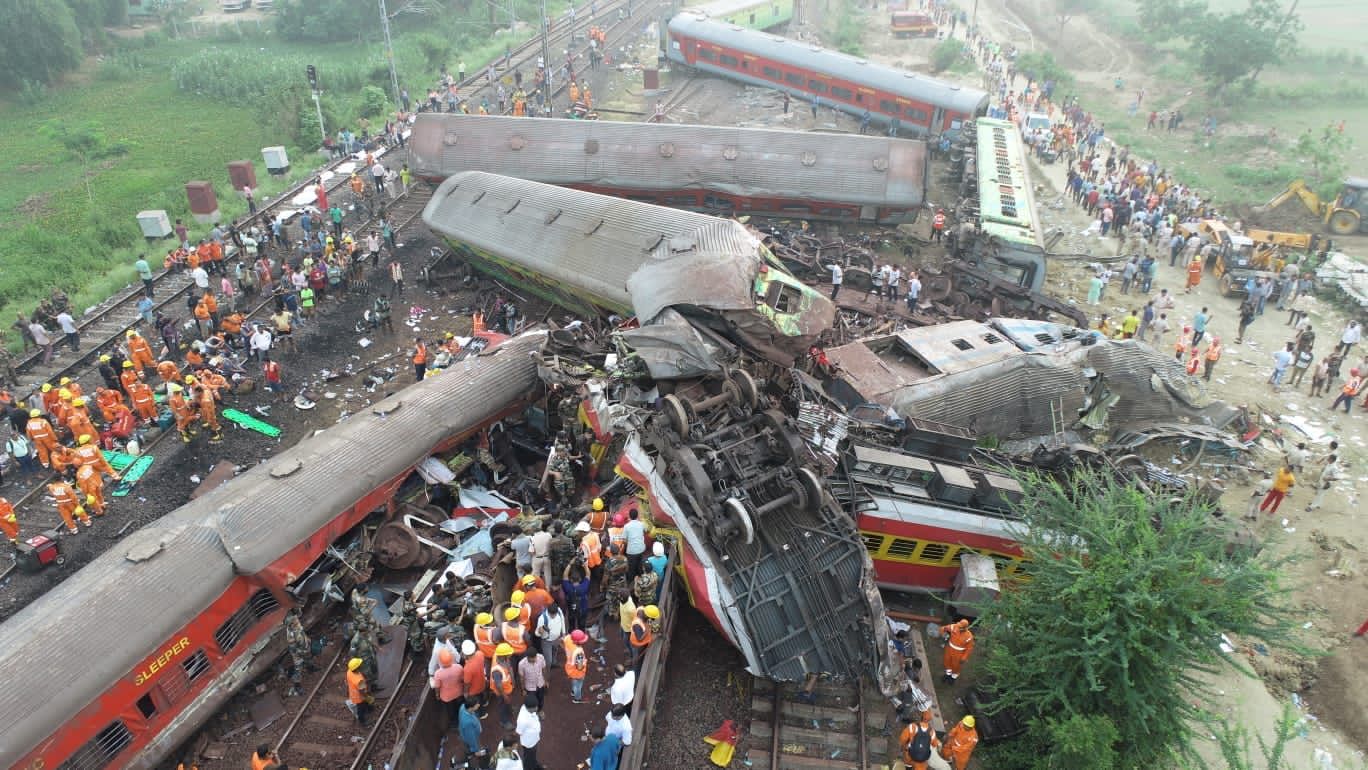The public letter, apart from listing the accidents in the recent past, also highlighted the lack of accountability from the Railway Ministry.
Published Aug 23, 2024 | 11:47 AM ⚊ Updated Aug 23, 2024 | 11:47 AM

Rescue personnel work at the scene of accident near Bahanaga Railway Station in Odisha’s Balasore district. (Supplied).
Indian Railways saw a series of train accidents in the recent past, with the Balasore train crash being the most fatal. Given the accidents, and lack of safety and accountability, the People’s Commission on Public Sector and Public Services— a group of academics, erstwhile administrators, trade unionists and social activists, expressed their concern and outrage in a missive dated Thursday, 22 August.
The letter noted that “The spate of railway accidents since June 2023, starting with one of the worst-ever disasters, at Balasore, and the most recent one, just a few days ago in August, highlights serious problems with the administration of the Indian Railways. There is an immediate need to apportion responsibility for this unfortunate situation, starting right at the top of the political and administrative leadership.”
The public letter, apart from listing the accidents in the recent past, also highlighted the lack of accountability from the Railway Ministry.
In July-August itself the Railways oversaw nine train derailments, killing eight people and injuring several.
They further cited the abandonment of a separate Railway budget in 2017, as one of the prominent reasons for the deterioration of the Indian Railways.
“It has not only curtailed Parliamentary oversight but also prevented the government from focusing on the specific needs of such an important department that has a commanding influence on national social and economic life. The lack of accountability that this has engendered has significantly eroded public confidence in the Indian Railways, an institution that has been the nation’s pride.”
Railway derailments year-wise:
Meanwhile, according to a report by the Commission of Railway Safety, the number of railway accidents increased from 35 in 2021-22 to 48 in 2022-23, with serious accidents doubling in successive years.
The report noted that derailments caused most of the accidents, accounting for 75 percent of the total in 2022-23 and over 77 percent in 2021-22. Collision and fire were the next biggest causes.
According to a CAG report published in 2022, which examined the causes of derailments, one-fourth of all derailments were attributable to poor or inadequate track maintenance.
The letter noted that the allocations for “track renewals”, which is supposed to address this specific need, have been dwindling in recent years.
The commission further noted that another major point of concern is near misses, which are not being reported diligently.
The missive read: “Those familiar with the intricacies of railway operations, and those familiar with its workforce agree that the draconian methods adopted by the senior authorities, with the knowledge and connivance of the top officials, have undermined long-established practices of railway operations that are necessary for the safe running of trains.”
“As a result, railway employees are regularly forced to work in violation of operational procedures and guidelines prescribed in the rulebook. In particular, the mounting exigencies of traffic operations have dominated operational safety-related rules, criteria, and standards that are generally regarded as non-negotiable for the safe running of trains.”
The commission suggested adopting a strong whistleblower framework by the Indian Railways so that employees are actively encouraged to expose such violations. “This will have the effect of not just resulting in a much better database on the actual performance on the safety front but also ensuring better accountability.”
The commission notes that the Railways at present have 3.12 lakh vacancies, which directly puts additional burden on the present workforce.
They further claimed, that there is a shortage among all sections of safety category workers— train drivers, inspectors, crew controllers, loco instructors, train controllers, station masters, electrical signal maintainers, signalling supervisors, track maintainers, and pointsmen among others.
The loco pilots who are the most important people responsible for maintaining the safety of trains are often overworked, sometimes working in 20-hour shifts a day.
In the case of station masters, their workload has increased with increased traffic and no adequate workforce to match.
With 65,000 electrical signal maintainers (ESMs), they are forced to be on call 24 hours, leading to them being overworked. The commission noted that the ESMs have been demanding to increase their workforce to at least 1,50,000 ESMs so that there can be separate morning and night shifts.
Regarding the track maintainers, the commission states that they are the most vulnerable in the entire railway workforce. While they are expected to move in groups of four to five, right now with less workforce, they are forced to work in groups of two to three.
The missive further read: “Currently, the strength of track maintainers at all India level is around 2.5 lakh workers. However, given that the sanctioned strength is 4 lakh workers, this implies a shortfall of over 1.5 lakh workers. Track maintainers argue that a proper cadre review would reveal that 6 lakh maintainers are required.”
The commission concluded the letter by putting forward the following demands:
(Edited by Sumavarsha Kandula)
